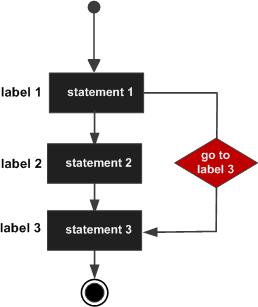goto statement in C
goto statement in C
A goto statement in C programming provides an unconditional jump from the 'goto' to a labeled statement in the same function.
NOTE − Use of goto statement is highly discouraged in any programming language because it makes difficult to trace the control flow of a program, making the program hard to understand and hard to modify. Any program that uses a goto can be rewritten to avoid them.
Syntax
The syntax for a goto statement in C is as follows −
goto label; .. . label: statement;
Here label can be any plain text except C keyword and it can be set anywhere in the C program above or below to gotostatement.
Flow Diagram

Example
#include <stdio.h> int main () { /* local variable definition */ int a = 10; /* do loop execution */ LOOP:do { if( a == 15) { /* skip the iteration */ a = a + 1; goto LOOP; } printf("value of a: %d\n", a); a++; }while( a < 20 ); return 0; }
When the above code is compiled and executed, it produces the following result −
value of a: 10 value of a: 11 value of a: 12 value of a: 13 value of a: 14 value of a: 16 value of a: 17 value of a: 18 value of a: 19
The exit() function:
- In C exit() is a predefined/ library function used to terminate the currently running program(process) immediately.
Syntax: void exit(int status);
- status -> The status in an integer value returned to the parent process.
- Here 0 usually means program completed successfully, and nonzero values are used as error codes. e.g exit(0);
- There are also predefined macros EXIT_SUCCESS and EXIT_FAILURE, e.g. exit(EXIT_SUCCESS);
- In the C Language, the required header for the exit( ) function is stdlib.h.
Example:
Sample Output Start of the main()… Exiting the main()…
Comments
Post a Comment